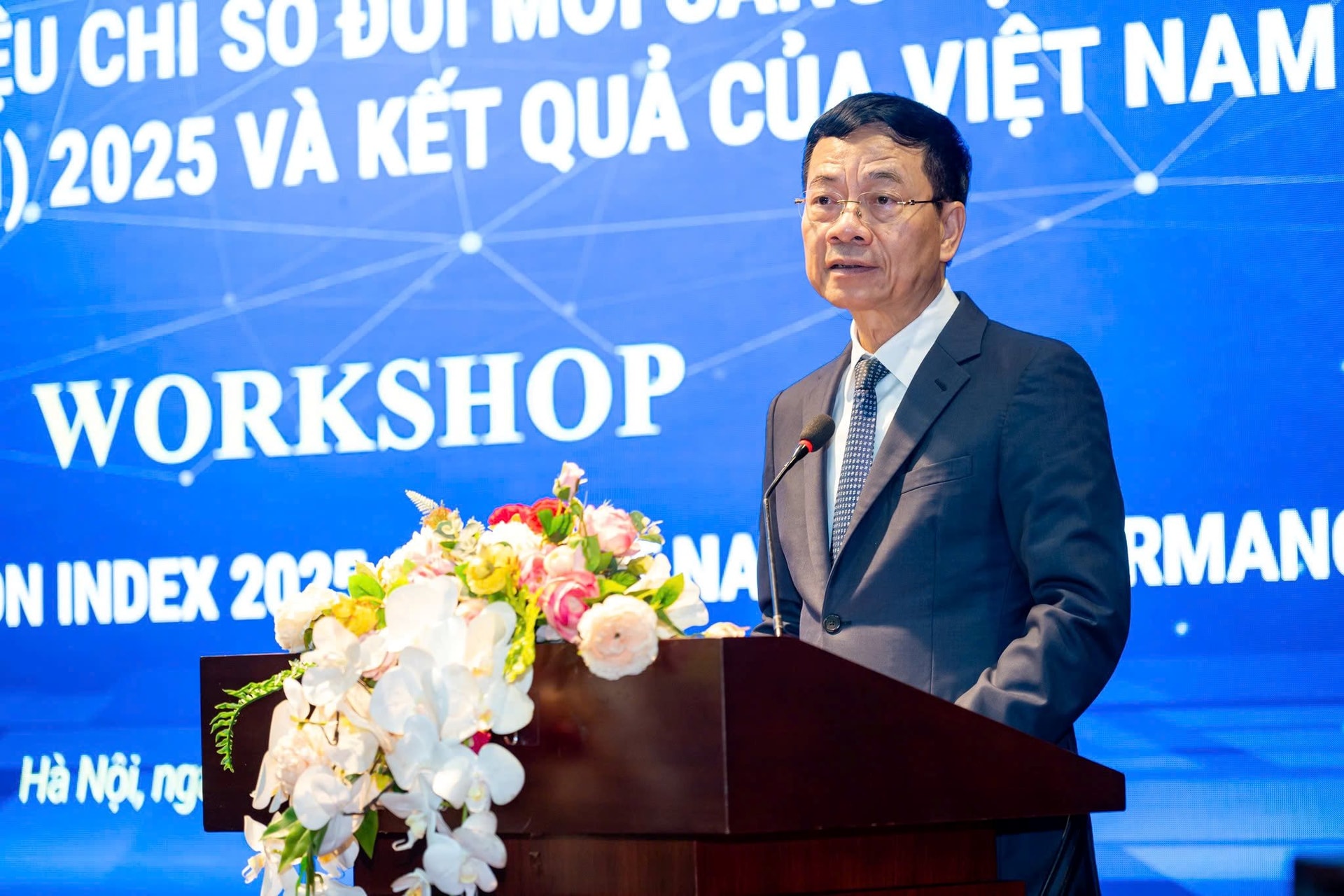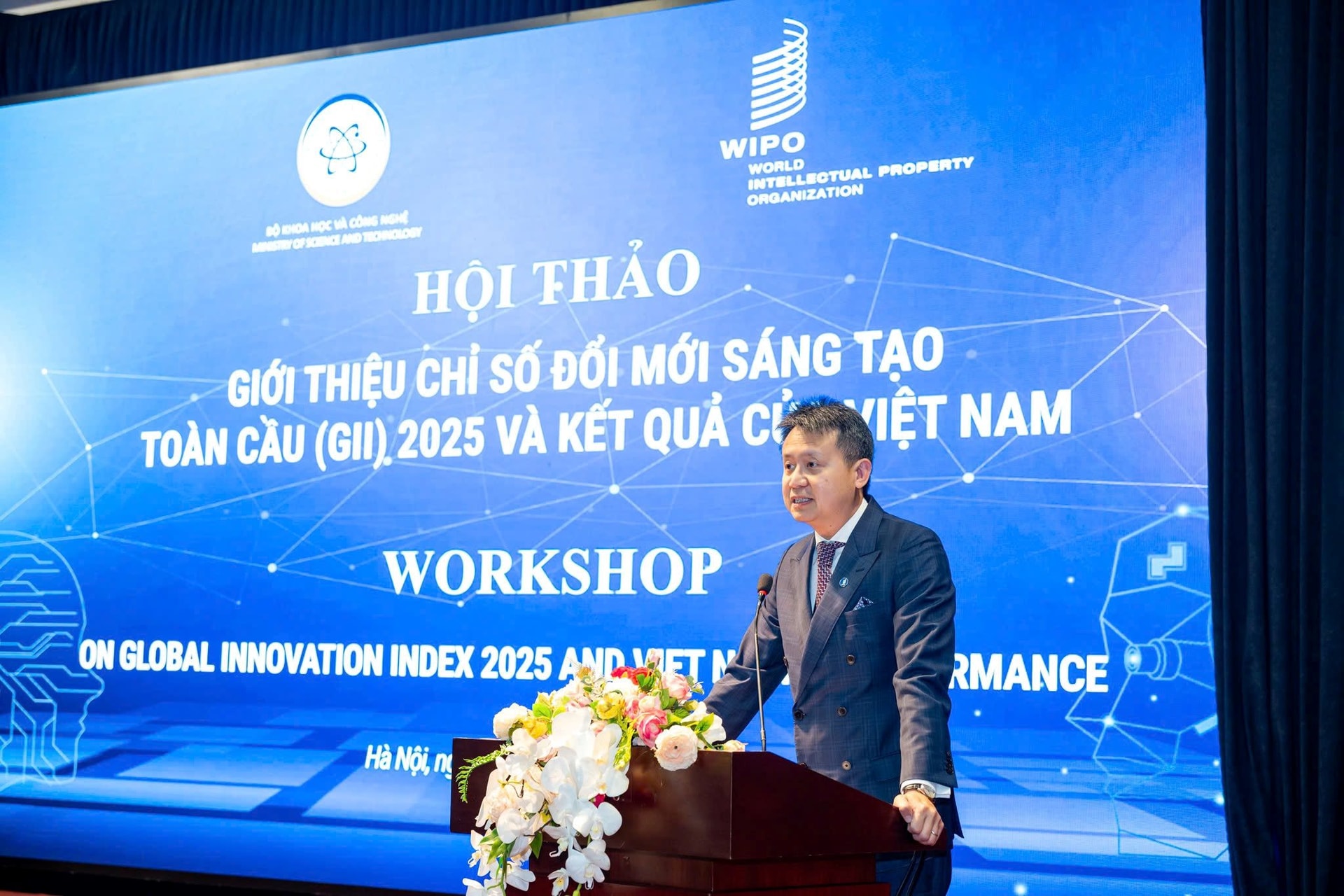Vietnam aims for the global top 30 in innovation
Minister of Science and Technology Nguyễn Mạnh Hùng proposed that WIPO implement a program to support Vietnam in improving the ranking on the Global Innovation Index (GII), with the goal of reaching the top 30 globally within the next 5 to 10 years.

On September 25, 2025, the Ministry of Science and Technology (MST) and the World Intellectual Property Organization (WIPO) jointly organized a workshop to introduce the 2025 Global Innovation Index (GII) and Vietnam’s results. The workshop provided the latest information on the GII 2025 report, methodological adjustments, index significance, innovation trends, and Vietnam’s prospects in the coming years.
Vietnam’s innovation must be people-centric
Speaking at the workshop, Minister Nguyễn Mạnh Hùng stated that the event was a significant opportunity to reflect on Vietnam’s efforts and outline a path to promote the development of science, technology, innovation, and digital transformation. Among these three pillars, innovation is the central focus.
Minister Nguyễn Mạnh Hùng emphasized: “Vietnam’s innovation must be people-centric.” Innovation should bring science and technology to address and solve Vietnam’s practical challenges, foster a spirit of innovation among the population, and make innovation a way of life and a lifestyle for every individual and organization. This will help build a startup nation driven by digital technology and innovation.
The GII is a comprehensive innovation index that enhances innovation capacity by guiding and analyzing the significance of each indicator, providing Vietnam with clear grounds to improve its capabilities and directly contribute to sustainable development goals.
Minister Nguyễn Mạnh Hùng proposed that WIPO would implement a program to support Vietnam in improving GII ranking, aiming to reach the top 30 globally within 5 to 10 years. This is a challenging goal that requires synchronized efforts from the entire political system, scientific and technological community, and businesses.
“We look forward to the direct support and collaboration of WIPO and Mr. Director General. The Ministry of Science and Technology will be the focal point for close and effective cooperation with WIPO to achieve this goal,” the Minister affirmed.
Four Priority Solutions
To continue improving Vietnam’s position on the GII rankings, Minister Nguyễn Mạnh Hùng outlined four key solution groups:
First, improve the institutional framework and innovation environment. Vietnam needs to remove legal, financial, and intellectual property barriers while encouraging businesses to boldly invest in research and development (R&D) and the application of new technologies.
By the end of 2025, three key laws - Intellectual Property Law, Technology Transfer Law, and High-Tech Law - will be amended to treat research outcomes as assets that can be traded, valued, included in financial reports, used as collateral for loans, or contributed as capital.
The most significant shift this time is moving from protecting rights to commercializing, and marketing research outcomes. Intellectual property must become a strategic competitive tool for businesses and the nation, the Minister emphasized: “A developed nation is one where 70-80% of assets are intellectual property. Vietnam has reached a stage where prioritizing intellectual property to become a developed, high-income country.”
Second, invest in science, technology, innovation, and digital infrastructure. Vietnam will establish modern research centers, laboratories, supercomputers, open data systems, and interconnected national networks—fundamental platforms for breakthrough innovation.
Third, develop high-quality human resources. Policies will focus on innovating STEM education, promoting collaboration between universities, research institutes, and businesses, while attracting and valuing talent from both within and outside the country.
Fourth, promote innovation in businesses. Businesses must be the core of the innovation ecosystem. The State will support them through financial assistance programs, venture capital funds, research procurement mechanisms, and prioritizing public procurement for new products.
By effectively implementing these four solutions, Vietnam’s current position in the rankings will continuously improve. More importantly, innovation capacity will become a true strength for the nation, contributing to realizing the goal of a developed, creative, and prosperous Vietnam, Minister Nguyễn Mạnh Hùng emphasized.
Science, technology, and innovation as the central driver for development
Speaking at the workshop, WIPO Director General, Mr. Daren Tang commended Vietnam’s efforts in promoting science, technology, intellectual property, and innovation. He emphasized that WIPO would enhance its support for Vietnam in achieving its goals of promoting intellectual property and innovation in the coming period.

He noted that Vietnam has set an ambitious goal of becoming an upper-middle-income industrial country by 2030 and a high-income country by 2045. To achieve this, innovation and intellectual property will be key, with Resolution 57 serving as a guiding framework, making science, technology, and innovation the central driver for development.
According to the GII 2025 report, Vietnam ranks 44th out of 139 economies, second among 37 low-middle-income countries, and ninth in the Southeast Asia, East Asia, and Oceania region. Notably, Vietnam has consistently outperformed its income group for over a decade.
One of the key factors in Vietnam’s outstanding performance is its governance approach. Since 2017, the Government has used GII as a management tool, continuously implemented solutions to improve each indicator. Additionally, Vietnam has “localized” GII into the Provincial Innovation Index (PII), enabling localities to self-assess and compete constructively while issuing intellectual property policies closely tied to innovation.
Priority areas for cooperation include supporting the review, development, and enforcement of intellectual property laws, strategies, and action plans at the national level; promoting the effective operation and use of international intellectual property registration systems in Vietnam; enhancing the capacity of intermediary organizations, small and medium-sized enterprises, and startups in managing, protecting, and commercializing intellectual property assets.
Innovation must be built through institutions, infrastructure, human resources, businesses, and synchronized policies
Experts believe Vietnam has significant room to improve its innovation capacity, particularly in research human resources, commercialization of scientific outcomes, and fostering an entrepreneurial spirit.
A representative from the Intellectual Property Office stated that, according to the GII 2025 results, some of Vietnam’s indicators remained low, such as pupil-teacher ratio (ranked 107th) and the proportion of international students studying and researching in Vietnam (ranked 108th). This indicates that domestic universities have not yet attracted external high-quality talent, posing a barrier to the innovation ecosystem.
Dr. Đinh Việt Hòa, Chairman of the National Startup Association, noted that the entrepreneurial spirit is vital. Vietnam has set a record for the number of new businesses, but more importantly, businesses must create value for society. Focus should be on three factors: selecting high-intellectual products, integrating innovation into governance, and supporting businesses in analyzing and selecting markets to conquer.
At the workshop, WIPO expert, Mr. Sacha Wunsch-Vincent provided recommendations to help Vietnam continue improving its GII ranking, focusing on five pillars: investing more and more effectively in R&D; building stronger links between science and industry; moving from assembly to proactive production; developing the startup and growth finance ecosystem; forming and managing intangible assets to attract value.
Experts also emphasized that innovation does not emerge spontaneously but must be cultivated through synchronized institutions, infrastructure, human resources, businesses, and policies. Vietnam is converging all these factors, with strong political determination, the support of the scientific and technological community, businesses, and international assistance from WIPO.
---
Translation copyright belongs to Vietnam Journal of Science and Technology (VJST).

